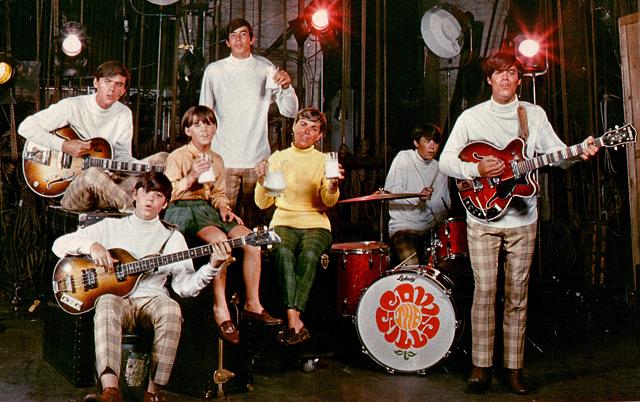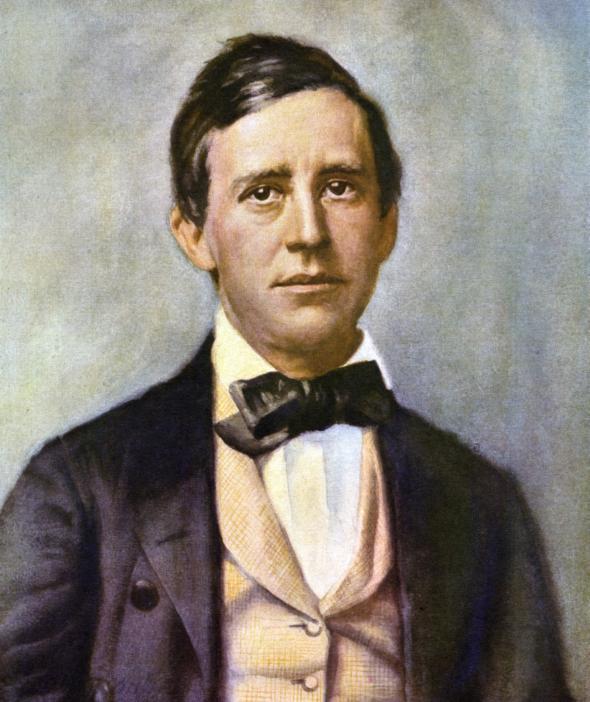Susan On The Cowsills: ‘I Think We Were Amazing!'
The Cowsills: from left: Barry (bass), John (guitar), Susan, Bob (standing, behind Susan), mom Barbara, Paul, BillyAs llong as we were interviewing Susan Cowsill for this issue, it seemed only right to tip our hats to her great family band, The Cowsills, whose records rank with the ‘60s most enduring hits. A brief discourse with Susan follows, specific to The Cowsills.
The Cowsills worked with some interesting producers. I know you were very young, but did that prove valuable to you as you got older and got into recording, that you had already been there on a pretty high level? Were you too young to appreciate it or absorb it? Was it useful to you?
Susan: I don’t know if it was useful, but I wasn’t too young to absorb it, because that’s how I know to do what I do. But I think you kind of cellularly learn as you go along, the brain being the absorbent sponge that it is. They talk about kids and how get what they get, even though they don’t know they’re getting it. I probably gained a lot from that experience, you know what I mean? I mean I wouldn’t be—the first song I ever wrote was “The Rain Song,” with the Continental Drifters, and it really came out pretty nicely, had this great pop construction. I don’t know where that came from. I assume it was from being around all these amazing artists—musicians, producers, I mean Artie Kornfeld was amazing. Wes Farrell was no slouch! I wasn’t sitting there studying them, but I certainly know, from the stuff that comes out of me, that something was attaching itself to my instincts.
When you reflect or are asked about when you guys were really in the pop hierarchy of the time, how do you regard the Cowsills’ body of work? Proud of what you did?
Susan: Oh, my God! Yes! Oh, yeah, I think we were amazing—I know we were amazing. I regard it as a great honor and privilege to have been in that band. My brothers were baby geniuses, and everything we did was high quality, beautiful—if you don’t like the genre, that’s one thing, but it doesn’t take away the quality of it in any way, shape or form. We made the best pop music—well, not the best but some of the best—of our time. And I’m incredibly proud. I love that music; I love to sing it, I love to hear it, I still listen to classic radio, and I regard us one of the best bands of the ‘60s.
On the Captain Sad album you take the lead vocal on “Ask the Children.” It was your first recorded vocal, and you really gave it a knockout reading.
Susan: Yesssss, it was my first lead vocal!!! And I had to share it with Barry! I was pretty excited to sink my teeth into that baby.
There is one other great Cowsills album that came much later. I thought then it was one of the best albums of that time—1999—and I would stand by that today, meaning Global.
Susan: Global is awesome.
On Amazon, it’s going for $260.
Susan: On Amazon?
Yeah. The vinyl.
Susan: Global?
Yes.
Susan: Hmmm. What a trip. See, Global, what a beautiful record. —David McGee
The Cowsills, ‘The Rain, The Park & Other Things,’ the band’s first hit, 1967, the year before eight-year-old Susan joined the band. She’s in this video, though, cavorting in a park with her mother and brothers.
The Cowsills on The Johnny Cash Show, performing ‘Monday, Monday,’ and, with Cash, the gospel raveup, ‘Children, How Do I Send Thee.’
The Cowsills, ‘Indian Lake,’ one of the great ‘60s singles, from the album Captain Sad & His Ship of Fools, 1968.
The Cowsills, ‘Hair’—the most effective endorsement the Broadway musical ever received.
A clip from the Cowsills’ 1968 TV special. It features Susan and brothers Bob and Bill singing and bathing the dog; Bob and Bill writing a song together at ‘Cowsill Central,’ helmed by father Bud Cowsill; and Susan hoofing it up with Buddy Ebsen. Susan would leave the family home when she was 12 years old, in order to escape her sexually abusive father.
The Cowsills, ‘Some Good Years.’ Yes, indeed.Happy Birthday, Stephen Foster!
Born July 4, 1826, the father of the American popular song set the bar high for the songwriters who have followed him. “My Old Kentucky Home,” “Beautiful Dreamer,” “Camptown Races,” “Jeannie With the Light Brown Hair,” “The Hour For Thee and Me,” “Our Bright, Bright Summer Days Are Gone,” “The Voices That Are Gone,” and the ever timely “Hard Times Come Again No More”—the list is too long for this page but replete with evocative and poignant reflections and the artful use of language that formed the foundation of the Great American Songbook of the 20th Century. Though many of his tunes were written in the minstrelsy tradition, Foster insisted white performers not only refrain from making fun of slaves, but actualy inspire in audiencescompassion for slaves' plight. He is quoted as saying his aim in writing these songs was to “build up taste among refined people by making words suitable to their taste, instead of the trashy and really offensive words which belong to some songs of that order.” Foster also sought to make his living as a professional songwriter, though no such profession existed at a time when music copyright and writer royalties were fairly undefined areas, to say the least. Though a fair royalty agreement might have made him comfortable, if not wealthy, from the sales of sheet music of his songs, Foster realized little profit from songwriting, as other publishers often issued their own competing versions of his songs, without compensating Foster at all. It is said he received only $100 for one of his most popular tunes, “Oh, Susanna.”
The end of Foster’s life was heartbreaking. After moving to New York City in 1860, he was abandoned by his wife and daughter a year later, who returned to Pittsburgh, Pennsylvania, near Laurence, where Foster was born. Rooming at the American Hotel located at 30 Bowery, he fell into deep poverty. In early January 1864, after being bedridden for three days with a fever, Foster fell while attempting to call for a chambermaid and suffered a severe head laceration. He languished for three hours in his room before being transported to Bellevue Hospital, where he died three days later, at age 37.
Rosa Ponselle, ‘My Old Kentucky Home,’ recorded June 1925. Ponselle, one of the greatest operatic sopranos of the 20th Century recorded this when she was 28, seven years into a 21-year tenure with the Metropolitan Opera. She retired at age 40, at the height of her popularity and still in exemplary voice (save for a receding upper register) after playing Carmen on April 22, 1937. She died on May 25, 1981, at age 84, after a long battle with bone marrow cancer.
‘Old Folks at Home (Swanee River),’ Deanna Durbin, from the 1941 film, Nice Girl, also starring Franchot Tone, Robert Benchley, Walter Brennan, and Robert Stack. Adapted for the screen by Richard Connell from a play by Phyllis Duganne, Nice Girl, directed by William A. Seiter, was one of the first movies to look at life in America during World War II.
Chet Atkins, ‘Stephen Foster Medley’—the masters at their finest
James Taylor, Yo-Yo Ma, Mark O’Connor and Edgar Meyer, ‘Hard Times Come Again No More’
Alison Krauss, Yo-Yo Ma, Mark O’Connor, Edgar Meyer, ‘Slumber My Darling’—‘Slumber my darling, thy mother is near/guarding they dreams from all terror and fear…’
Roy Orbison, ‘Beautiful Dreamer’
The Beatles, ‘Beautiful Dreamer,’ live at the Saturday Club, January 22, 1963, The Playhouse Theatre, Northumberland Avenue, London. The announcer is Brian Matthew
THE BLUEGRASS SPECIAL
Founder/Publisher/Editor: David McGee
Contributing Editors: Billy Altman, Laura Fissinger, Christopher Hill, Derk Richardson
Logo Design: John Mendelsohn (www.johnmendelsohn.com)
Website Design: Kieran McGee (www.kieranmcgee.com)
Staff Photographers: Audrey Harrod (Louisville, KY; www.flickr.com/audreyharrod), Alicia Zappier (New York)
E-mail: thebluegrassspecial@gmail.com
Mailing Address: David McGee, 201 W. 85 St.—5B, New York, NY 10024
Founder/Publisher/Editor: David McGee
Contributing Editors: Billy Altman, Laura Fissinger, Christopher Hill, Derk Richardson
Logo Design: John Mendelsohn (www.johnmendelsohn.com)
Website Design: Kieran McGee (www.kieranmcgee.com)
Staff Photographers: Audrey Harrod (Louisville, KY; www.flickr.com/audreyharrod), Alicia Zappier (New York)
E-mail: thebluegrassspecial@gmail.com
Mailing Address: David McGee, 201 W. 85 St.—5B, New York, NY 10024



